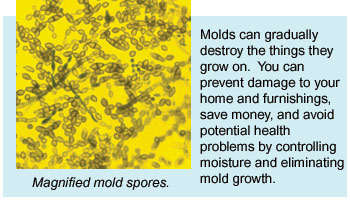 If you want
to buy a condo in New York City, it is prudent to have an inspection of the apartment. It is wise to have an inspection done either 1) before signing any contract;
or 2) have your attorney draft language in the the contract conditioned upon inspection results that gives you the option of getting out of the sale if hazardous materials are
found in the apartment that can affect you and your family. Again, you need to discuss these issues with your attorney
If you want
to buy a condo in New York City, it is prudent to have an inspection of the apartment. It is wise to have an inspection done either 1) before signing any contract;
or 2) have your attorney draft language in the the contract conditioned upon inspection results that gives you the option of getting out of the sale if hazardous materials are
found in the apartment that can affect you and your family. Again, you need to discuss these issues with your attorney
Lead, Mold, Asbestos, and the Law
The dangers of lead paint upon children can be catastriphic and long-lasting. Before 1970, most interior home paint contained hazardous amounts of lead. The concern by
physicians and government safety experts over childhood lead poisoning led to federal, state, and local laws to protect against lead-based paint hazards.
The Residential Lead-Based Paint Hazard Reduction Act of 1992 requireed HUD and EPA to require the disclosure of known information on lead-based paint and lead-based paint hazards before the sale or lease of most housing built before 1978.
Federal law also requires sellers to offer buyers a 10-day period to conduct an inspection or risk assessment for lead-based paint or lead-based paint hazards.
You will frequently find, however, that buyers and sellers mutually agree, in writing, to either lengthen or shorten the time period for such inspection, or
have buyers affirmatively waive their lead-based paint inspection rights. In a seller’s market, this can add to buyers’ agita, compounded by bidding
wars for apartments. Talk with your attorney about the risks and possible consequences of opting out of the 10-day requirement for lead inspection and
risk assessment under federal law.
Mold Hazards In Your Home
Unfortunately, mold is a growing problem that many homeowners. The combination of a damp environment and the presence of mold spores can spur potentially hazardous mold growth in your home. If the seller of the condo you want has recognizable water spots in the unit, or black mold present throughout a bathroom or kitchen, you could be buying into a mold problem.
The U.S. Environmental Protection Agency (“EPA”), lawyers, the insurance industry, and housing experts recognize that mold remains a serious health hazard. Molds produce allergens that can cause allergic reactions, irritants, and in some cases, potentially toxic substances. People sensitive to these allergens can have sever allerged reactions by inhaling or touching mold and mold spores.
Getting rid of mold, and preventing its growth, can be a time-consuming and expensive proposition.
Finallly, asbestos hazards can be present in many pre-war New York City apartment buildings. Asbestos used to be a common insulator and fire-prevention agent found in and around apartment radiators and heating pipes. It is also recognized as a human carcinogen by the U.S. Dept. of Health and Human Services, World Health Organization. If it becomes airborne a/k/a “friable,” asbestos poses a health hazard not only to people, but also to pets in your home. In fact, asbestos hazards to humans were first recognized only after dogs were diagnosed with mesothelioma, a fatal lung cancer caused by asbestos fibers.
Why A Home Inspection Can HelpAn experienced home inspection engineer can help educate you about potential health risks and necessary remedial work for any hazardous materials in the apartment you want to buy. Is it worth spending the money for an inspection? That depends on how comfortable you would be living in apartment containing health hazards that you or your family never knew about. Only you can decide your comfort level on whether to conduct a home inspection. if you are willing to live with hazardous levels of lead, mold, or asbestos that were in your condo when the seller put it on the market. Again, consult with your attorney, physician, and insurance agent about the potential risks involved. Once you have more information, hopefully you can make an informed decision about conducting an inspection on the condo that you want to buy -- your future home.

